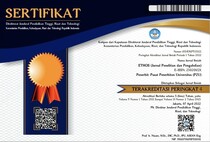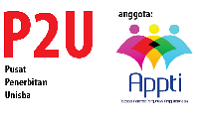Model Kelembagaan Pengelolaan Klaster Industri: Studi Kasus Kawasan Industri di Cikarang Kabupaten Bekasi
Abstract
Abstract. The industrial region in Cikarang Bekasi has a strategic position and an important role as Special Economic Zone in the International Zone (ZONI), but the existence of the area is still enclave since its form is not a cluster, It made it has not been able to give the trickling down effect to the surrounding area. Moreover, the industrial region nowadays is still managed by developers and it does not have certain institute that is able to increase the supply chain (between the large industries and SMEs) as happened in other countries (Austria, India, Pakistan, Korea, etc), that makes it can’t be able to encourage the growth of regional economies. Therefore, It is needed an institution that is able to encourage the formation and management of industrial cluster in Cikarang Bekasi. This study used a study case approach to observe the empirical issues and formulate the recommendations. This research conduct the literature review toward another institute cluster models on other’s country to produce the general model, do the analysis of law regulations and Social Network Analysis (SNA) to look the empirical issues, and do the stakeholder analysis to see the role which involved in industrial region in Cikarang Bekasi, that will be used to formulate the institutional recommendation. The general model of cluster industrial management’s institute consists of 5 (five) main actor, they are the ministry (central government), Regional/City Government, Universities, Industrial Associations, and a Group of Large Industry. In the Bekasi Cikarang industrial region, all the main actors were involved, but there’s no specifically a person in charge that designed the cluster industry as in other’s countries. It happened due to there’s no regulation that defines the region as industrial cluster and the large industrial or government are not given responsibility to built a supply chain production and formulate the cluster. So far, only ITB who become the main actor of all the information, therefore the network formed is still low, at 23%. The actor who has the high possibility to become the stakeholder leader in implementing the industrial cluster and integrate all the actor is KUKM Ministry and Industrial and Trade Ministry, in collaboration with ITB, West Java Government, Bekasi District Government, Association, and the Large Industrial Groups which legalized in a MoU/law regulation
Abstrak. Kawasan industri yang ada di Cikarang Bekasi memiliki posisi strategis dan peran penting sebagai Special Economic Zone di Zona Internasional (ZONI), namun selama ini keberadaan kawasan tersebut masih bersifat enclave karena belum berbentuk klaster, sehingga belum mampu memberikan tricklingdown effect bagi wilayah sekitarnya. Selain itu, kawasan industri yang ada saat ini juga masih dikelola oleh pengembang dan belum memiliki kelembagaan yang mampu meningkatkan supply chain (antara industri besar dan IKM)sebagaimana yang terjadi di negara-negara lain (Austria, India, Pakistan, Korea, dll), sehingga belum mampu mendorong pertumbuhan ekonomi regional. Oleh karena itu, diperlukan sebuah kelembagaan yang mampu mendorong pembentukan dan pengelolaan klaster industri di Cikarang Bekasi. Studi ini menggunakan pendekatan studi kasus untuk melihat persoalan empirik dan merumuskan rekomendasi. Melakukan kajian literatur terhadap model-model kelembagaan klaster yang ada di negara lain untuk menghasilkan model umum, melakukan analisis peraturan perundang-undangan dan Social Network Analysis (SNA) untuk melihat persoalan empirik, dan melakukan analisis stakeholder untuk melihat peran masing-masing aktor yang terlibat dalam Kawasan Industri di Cikarang Bekasi yang akan digunakan untuk merumuskan rekomendasi kelembagaan. Model umum kelembagaan pengelolaan klaster industri terdiri dari 5 (lima) aktor utama, yaitu Kementrian (pemerintah pusat), Pemerintah Daerah/Kota, Universitas, Asosiasi Industri, dan kelompok Industri Besar. Di Kawasan Industri Cikarang Bekasi semua aktor tersebut telah terlibat, namun tidak ada penanggung jawab yang ditunjuk secara khusus untuk membentuk klaster industri seperti di negara-negara lain. Hal ini disebabkan karena tidak ada aturan yang menetapkan kawasan tersebut sebagai klaster industri dan kelompok industri besar maupun pemerintah tidak diberikan tanggung jawab untuk membangun mata rantai produksi dan membentuk klaster. Selama ini hanya ITB yang menjadi aktor pusat keluar masuknya informasi, sehingga jaringan yang terbentuk masih sangat rendah, yaitu 23%. Aktor yang paling mungkin untuk menjadi stakeholder pemimpin dalam mengimplementasikan klaster industri dan mengintegrasikan berbagai aktor adalah Kementrian KUKM dan Kementrian Perindustrian dan Perdagangan, bekerja sama dengan ITB, Pemerintah Jabar, Pemda Kab. Bekasi, Asosiasi, dan Kelompok Industri Besar yang dilegalkan dalam sebuah MoU/peraturan perundang-undangan.
Keywords
Full Text:
PDFReferences
Hyop & Kim. 2012. Multi-scalar Dynamics of Cluster Development: The Role of Policies in Three Korean Clusters. Science & Technology Policy Institute, Korea.
Nibedita, S, dkk. 2011. The Power of Clustering and HRM as a Source of Competitive Advantage: Evidence from Clusters from Poland, Slovakia, the Czech Republic, India and Developed Countries. joc_4-2011en_v3.indd.
Porter, M.E. (1990.) The competitive advantage of nations. New York. Free Press.
Schmitz, H & nadvi,K. 1999. Clustering and Industrialization: Introduction. Institute of Development Studies, University of Sussex, UK. Vol. 27, No. 9, pp. 1503-1514, 1999.
Thomsen, L & Nadvi, K. 2010. Clusters, Chains and Compliance: Corporate Social Responsibility and Governance in Football Manufacturing in South Asia. Journal of Business Ethics _ Springer 2010 DOI 10.1007/s10551-010-0561-7
Yin, K. Robert. 2009. Case Study Research: Design and Methods. SAGE. United State of America
DOI: https://doi.org/10.29313/ethos.v7i1.3951
Refbacks
- There are currently no refbacks.
Alamat Redaksi:
LPPM Unisba, Lantai 2, Jl. Purnawarman 63, Bandung 40116, Jawa Barat, (022) 4203368 , (022) 4264064. ethos.unisba@gmail.com / ethos@unisba.ac.id

This work is licensed under a Creative Commons Attribution-NonCommercial-ShareAlike 4.0 International License.














